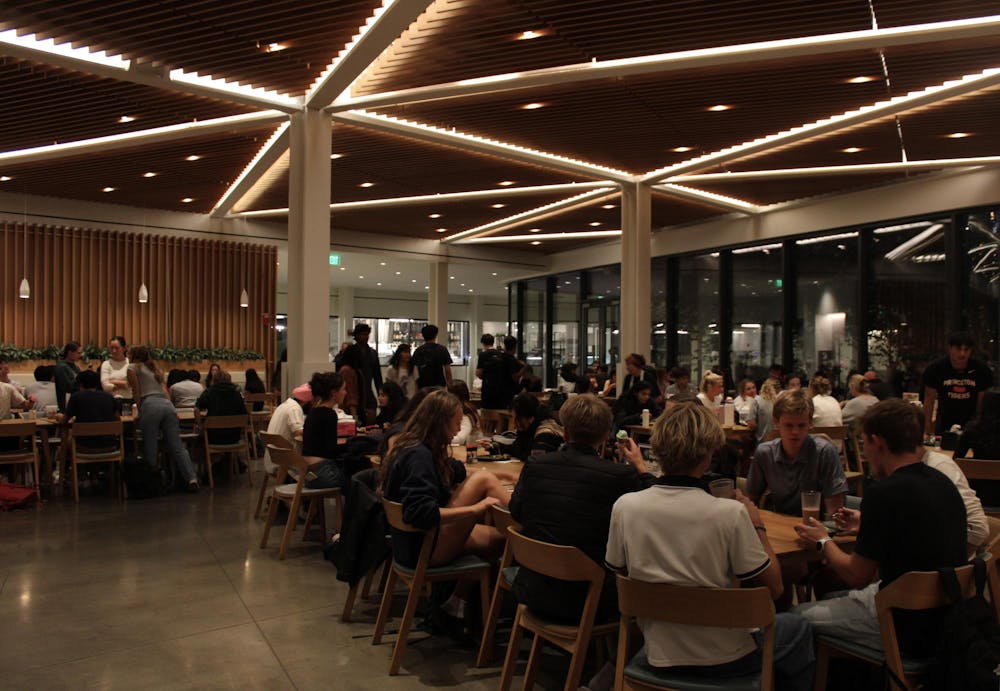Undergraduate Student Government (USG) representatives say they were left out of the loop on the changes to campus dining and housing announced last week, which have prompted significant backlash from students.
“USG was not involved in the decision-making process surrounding the dining and housing changes announced yesterday,” USG President Enzo Kho ’26 and Vice President Aishwarya Swamidurai ’26 wrote in a joint statement to The Daily Princetonian, adding that they had not been given prior notice of the changes.
Starting next fall, all juniors and seniors living on campus will be required to purchase a meal plan, effectively discontinuing the “independent” status for dining and housing. The changes have been met with frustration from independent students, eating clubs, and co-ops. Dining plan changes will impact some students’ financial aid refunds and could contribute to overcrowding in the dining halls.
In a statement to the ‘Prince,’ however, University spokesperson Michael Hotchkiss stated that input from undergraduate students and USG played “a significant role in the updated housing and dining program.”
“We continually evaluate our housing and dining program, and feedback from students will inform future decisions — just as feedback over many years played an important role in developing the current plans,” he wrote.
Assistant Vice President of Finance and Administration Maureen McWhirter echoed this sentiment at a USG meeting on Sunday, telling assembled students, “You all haven’t necessarily been here through all of these conversations, but we have been engaging with students.”
McWhirter added that the changes had long been in the works, telling USG, “I know you said [the change] was sudden. It‘s actually not.”
Kho and Swamidurai told the ‘Prince’ that the University engaged with USG in a limited capacity on potential dining and housing changes last spring related to the Huron report, which took stock of the state of campus dining.

“During our spring conversations with University leadership, we were made aware that changes to dining and housing were under consideration, given the Huron report and the changing budgetary landscape,” they wrote. “However, the scope, timeline, and exact details of those potential changes were not clearly defined at that time.”
According to Hotchkiss, University administrators led a discussion about dining and housing changes at a USG Undergraduate Student Life Committee meeting in April 2025.
Anuj Krishnan ’27, the undergraduate chair of the committee, said in an interview with the ‘Prince’ that the interaction consisted of a 15-minute presentation on the Huron report. “What really happened in the meeting was they just gave us a presentation, and then there was very little time to talk about it,” he said.
Hotchkiss provided the ‘Prince’ with a timeline of student input and involvement in planning around the undergraduate residential experience. Only the final instance of student engagement mentioned on the timeline — the April Student Life Committee meeting — explicitly mentions a discussion of future undergraduate dining and housing changes.

The statement from Hotchkiss also mentions the inclusion of the USG President — then Mayu Takeuchi ’23 — in the working group on the dining pilot program announced in 2022. A USG survey of undergraduate students at the time found that 74 percent of respondents held “mostly negative” views of the dining pilot program. A coalition of student leaders, including Takeuchi, even proposed an alternate plan to the administration.
Swamidurai told the ‘Prince’ that USG unanimously passed a resolution in 2022 calling for more transparency for the dining pilot from the Administration.
“The dining pilot was not co-administered or in collaboration with USG whatsoever,” said Swamidurai. “It was not endorsed by USG. And in fact, quite the opposite happened.”
The University’s timeline of student engagement begins in 2016 with student participation in a task force on the residential college model, which released a report in February 2016. One of the task group’s recommendations was the creation of another task group to assess dining options for juniors and seniors and “propose new options, if appropriate.”
Hotchkiss said that the Princeton University Board Plan Review Committee met regularly with USG and solicited student feedback between 2016 and 2018.
The timeline continues with student participation in a 2018 task force on the eating club-University relationship, which released a report with new recommendations, including exploring “possible synergistic relationships between the eating clubs and the residential colleges.” Neither the 2010 nor 2018 reports made suggestions akin to the dining and housing changes announced last week by the University.
“We think there is a responsibility on the side of the administration to ensure that current students … have a say,” said Krishnan. “Current students really feel out of the loop, and we think that’s a big problem, because they’re the ones who live with the results of these policies.”
Kho and Swamidurai asserted that they advocated for continued USG and student involvement during discussions with University administrators last spring.
“Throughout, we consistently communicated that any future decisions should be informed by robust student input and preceded by meaningful engagement with the broader campus community,” they wrote.
Krishnan said that USG expects genuine engagement from the University with student concerns over dining changes, telling the ‘Prince,’ “[The University] has to make an effort to go to where students are, rather than expecting students to come to them with their concerns, because we know that this change is going to affect everyone.”
The University will hold two information sessions on the planned changes on Oct. 7 at 1 p.m. in McCosh 64 and Oct. 8 at 6:30 p.m. in Frist Multipurpose Room C.
Kian Petlin is a staff News writer for the ‘Prince.’ He is from San Francisco, Calif. and typically covers campus events and student life.
Please send corrections to corrections[at]dailyprincetonian.com.
Correction: A previous version of this piece stated that Krishnan is the chair of Undergraduate Student Life Committee. It is more accurate to say that he is the undergraduate chair, as several administrators co-chair the committee alongside him.








